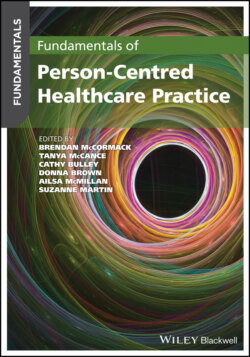Читать книгу Fundamentals of Person-Centred Healthcare Practice - Группа авторов - Страница 88
Human flourishing as happiness
ОглавлениеThe term ‘human flourishing’ has existed for thousands of years. Originally coined as eudaimonia (meaning human flourishing or happiness) by the philosopher Aristotle, the term has existed as a way of expressing all that we know to be human and to live out our personhood. Eudaimonia is an active term meaning we as human beings actively work in pursuit of happiness. Such happiness includes our subjective experiences in pursuit of ends (outcomes or achievements) that are worthy of choosing for human beings.
Eudaimonia is a unifying principle, suggesting that to be happy we have to actively pay attention to such virtues as belonging, harmony, social justice, fairness and equality. Being happy in the world (or to flourish) is not about the pursuit of pleasure, hedonia (think about hedonism!), but is the pursuit of a state of well‐being by ‘concurrently doing what I want to do while at the same time doing what I ought to do’. What Aristotle suggests here is a moral perspective on our being as agents in the world and which should resonate with us as healthcare workers – we are effective as a person when the actions we actually take are the same as those we ought to be taking as a moral agent. To do this requires an understanding of what is required of us as persons (the evidence that informs our practice) whilst at the same time being in a position to want to do the right thing, to enjoy doing it and sometimes to be uplifted by doing it.
So, to flourish means living out the virtues. Virtues are a subset of our character as persons. They are not innate qualities, like eyesight or hearing, but instead are characteristics we acquire and develop through our upbringing, experiences, education, etc. We build them over time and the more we actively work on them, the more attuned we become to how they work for us. The contrary also applies, of course, in that if we don't use them, we lose them and can slide into immoral attitudes and behaviours. If we consider some of the characteristics of persons discussed in Chapter 1, then the possession of virtues could also be seen as a defining characteristic of persons and one that distinguishes us from non‐persons. This is because behaving through the lens of the virtues requires us to have ‘reason’. That is, we have to reflect on our moral actions and make decisions about our behaviours, practices and actions and if they are morally virtuous or not. Such reflection guides our decisions and ultimately our life as moral agents, i.e. our flourishing. Aristotle identified four primary moral virtues – prudence, justice, temperance and fortitude – but over many years of critique and ongoing development of virtues as a framework for moral action (see for example MacIntyre 1992), the range of possible virtues to include in a virtues‐based moral framework has become much more diverse and inclusive.
